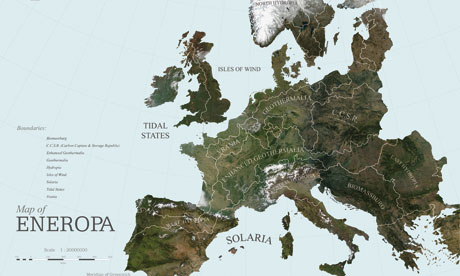
Rem Koolhaas has developed a "daring" plan to run Europe on a grid of shared renewable energy.
News
Rem Koolhaas has developed a "daring" plan to run Europe on a grid of shared renewable energy.
Frank Gehry argues that climate change and sustainable design are ultimately “political” issues. Over at Metropolis Magazine Susan S. Szenasy responds.
Eva Franch, Catalan architect, researcher, teacher and founder of OOAA [office of architectural affairs], has been selected to replace Joseph Grima to direct New York's Storefront for Art and Architecture.
USA Today reviews plans to develop green space over freeways in Dallas, Los Angeles, Cincinnati & St. Louis.
Christopher Hawthorne of Los Angeles Times reports from Medellín, on Colombia's architectural renaissance.
Discussion Threads
ElGrecus wants to know whether Neil Denari and/or Diller Scofidio can lay claim to be the originator of the fluid, curved line, interconnected floor plate look that was so popular in the '90s and even now?
Urbanist wonders what is an architecture of decline? What forms should cities of the more leisured (and downwardly mobile) take?.
School Blogs
Last week Harvard GSD school blogger Lian Chang represented Archinect on a private tour of Richard Meier's Model Museum in New York, led by Meier himself. Read report here.
John Tubles at Cal Poly Pomona / Kyushu University reports in from Shanghai World Expo 2010 Day 01 and he thinks the german pavillion is the best one amongst the nations pavillions...
Sally at University of Technology, Sydney who is in her fifth and final year joins the school blog party.
Meredith at McGill writes about Malcolm Wells, and notes that yesterday, May 14th, was "Underground America Day", which is a time to honor the 6,000 or so North Americans who make their homes not only on the Earth but in it, for those of you who don't know.
3 Comments
I personally don't see what the whole Frank Gehry controversy is about, nor why Inhabitat questions the politics of sustainability by putting politics within quotation marks. One could go on and on ad infinitum talking about why sustainability and climate change are inherently political issues. Of course, it all depends what side of the politics you're on (I don't think I would entirely agree with Gehry's politics either, though I think he's also been misrepresented), but to question the political nature of these issues is wrong, in my view, and what's worse, self-defeating. To de-politicize them is to surrender them to technocrats and to more conservative forces.
I also am tempted to say that the Koolhaas/deGraaf/OMA map of Europe (a) as someone put it on Twitter (wasn't it sevensixfive?), is like a bad master's thesis project. And (b), is pretty far from being daring, as the Guardian has stamped it. It seems to me that it's incredibly comfortable and un-daring, in fact. What can McKinsey (OMAs partners on the project) produce that's daring, after all? Sure, it's deliberately megalomaniacal, as they themselves acknowledge, but that hardly makes anything a risk. What did OMA put on the line here? The politics of it are simply the tired "energy independence" ideologies that take an uncomplicated look at globalization and interconnections between parts of the world. What's sad is that Europe is already moving forward with "Eneropa", except that it takes privatizing and enclosing parts of the Sahara. Taking on Europe's consumption and its existing imperial ways would have been daring, but why go there?
updated..
And yes it was 765, who made that comment.
As for the project I think it is definitely megalo-maniacal to think of transformation on that scale. Yet, i wonder what the chance of "success" the EU will have? Meaning if they can make Frankenstein mega-structures such as the EU and Euro, than? Despite the obvious political and social equity questions....
I did say something like that, yeah. My comment was that, in the absence of any background details, this project reads like a larger scale version of a vertical-farming school project: cool concept, visually aggressive diagrams (subway map?), but very little that's actually risky, new, or convincing.
Maybe they do have comprehensive spreadsheets under the hood, and they just weren't cool enough to include in the Observer article, but I sort of doubt it. When you're dealing with integrated systems like this, the whole thing lives or dies on the details, not just the big ideas, the catchy names, and the graphics.
And speaking of graphics, it's ridiculously cheeky to draw Europe as an island like that, which is the same point you all are making about 'independence'.
Block this user
Are you sure you want to block this user and hide all related comments throughout the site?
Archinect
This is your first comment on Archinect. Your comment will be visible once approved.